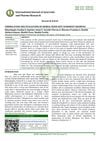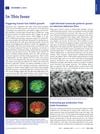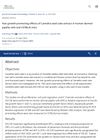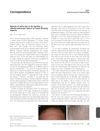 January 2023 in “International journal of Ayurveda and pharma research”
January 2023 in “International journal of Ayurveda and pharma research” The herbal shampoo is effective and safe for use.

The system helps lavender plants grow better by monitoring and adjusting their environment.
 March 2014 in “Human Physiology”
March 2014 in “Human Physiology” DHEA improved brain function and behavior in old monkeys and had additional health benefits.
 6 citations,
February 2014 in “Human & experimental toxicology”
6 citations,
February 2014 in “Human & experimental toxicology” Testosterone injections can cause skin darkening and thickening.
 2 citations,
January 2019 in “Indian Journal of Pharmaceutical Sciences”
2 citations,
January 2019 in “Indian Journal of Pharmaceutical Sciences” Zinc chloride can cause human scalp cells to multiply and die.
 January 2024 in “International Journal of Research Publication and Reviews”
January 2024 in “International Journal of Research Publication and Reviews” The herbal hair serum with rosemary, hibiscus, and neem is safe and effective for hair care.
 December 2013 in “Proceedings of the National Academy of Sciences of the United States of America”
December 2013 in “Proceedings of the National Academy of Sciences of the United States of America” Scientists found a new method using 3D cell cultures to grow human hair which may improve hair restoration treatments.
 2 citations,
April 2022 in “Journal of Cosmetic Dermatology”
2 citations,
April 2022 in “Journal of Cosmetic Dermatology” Camellia seed cake extract helps hair grow by affecting cell growth and growth factor levels.
24 citations,
January 2012 in “Journal of natural science, biology and medicine” Tinea capitis is common among Kolkata school children, especially boys, and hygiene doesn't greatly impact infection rates.
January 2023 in “Ethnobotany Research and Applications”  7 citations,
July 1990 in “Journal of the American Academy of Dermatology”
7 citations,
July 1990 in “Journal of the American Academy of Dermatology” A woman with bullous pemphigoid had an allergic reaction to azathioprine, but got better with alternative treatments.
20 citations,
January 2014 in “Tissue and Cell” MEBO ointment helps activate and grow skin stem cells for burn healing.
 13 citations,
October 2017 in “Biomedicine & Pharmacotherapy”
13 citations,
October 2017 in “Biomedicine & Pharmacotherapy” Eclipta alba extract may help treat obesity by blocking fat cell formation and lowering blood lipid levels.
 1 citations,
August 2020 in “IntechOpen eBooks”
1 citations,
August 2020 in “IntechOpen eBooks” Old drugs like finasteride and spironolactone are being successfully used for hair loss and skin conditions, and many other drugs show promise for new uses in dermatology.
22 citations,
September 2013 in “Science international” Leafy spices like basil and mint are very healthy and can help with digestion, hair loss, and inflammation.
 829 citations,
May 2007 in “Nature”
829 citations,
May 2007 in “Nature” Hair follicles can regrow in wounded adult mouse skin using a process like embryo development.
 33 citations,
August 2013 in “British Journal of Dermatology”
33 citations,
August 2013 in “British Journal of Dermatology” Lack of small, fine hair on the front hairline is a key sign of frontal fibrosing alopecia.
 February 2025 in “BMC Public Health”
February 2025 in “BMC Public Health” Unhealthy diet and lifestyle choices may increase the risk of hair loss in women.
 June 2013 in “Expert Review of Dermatology”
June 2013 in “Expert Review of Dermatology” The article concludes that hormonal therapy is an effective long-term acne treatment, even for those without hormonal imbalances.
 15 citations,
September 2013 in “Pharmaceutical Biology”
15 citations,
September 2013 in “Pharmaceutical Biology” Jujube fruit extract may reduce kidney damage from ibuprofen in rats.
7 citations,
April 2021 in “Journal of Bodywork and Movement Therapies” Recognizing and managing central sensitization and stress is crucial for treating chronic pain.
51 citations,
March 2001 in “Clinics in dermatology” Bleaching damages hair, making it rougher and weaker.
 1 citations,
December 2019 in “Journal of medicine and life science”
1 citations,
December 2019 in “Journal of medicine and life science” Docosahexaenoic acid (DHA) may help hair growth by promoting dermal papilla cell proliferation.
 41 citations,
October 2000 in “Dermatologic clinics”
41 citations,
October 2000 in “Dermatologic clinics” Better hair care products are needed to protect against grooming and chemical damage.
2 citations,
October 1985 in “Pediatrics in review” Scalp diseases change with age and can be hard to tell apart from hair disorders.
 April 2024 in “Medical & clinical research”
April 2024 in “Medical & clinical research” More research is needed to find the best long-term treatments for Alopecia Areata.
 1 citations,
January 2017 in “Indian Journal of Pharmaceutical Sciences”
1 citations,
January 2017 in “Indian Journal of Pharmaceutical Sciences” Women with PCOS often have different clinical signs, hormone levels, and gynecological issues compared to those without the condition.
 1 citations,
August 2004 in “Alternative & complementary therapies”
1 citations,
August 2004 in “Alternative & complementary therapies” Non-drug methods like diet, supplements, and aromatherapy can help manage hair loss and its emotional impact.

The document concludes that hair loss in women is complex, often linked to aging, health conditions, and nutritional deficiencies, and emotional impacts should not be underestimated.
 10 citations,
March 2015 in “Journal of dermatology”
10 citations,
March 2015 in “Journal of dermatology” The boy's severe skin disorder is caused by two new mutations in his TGM1 gene.























